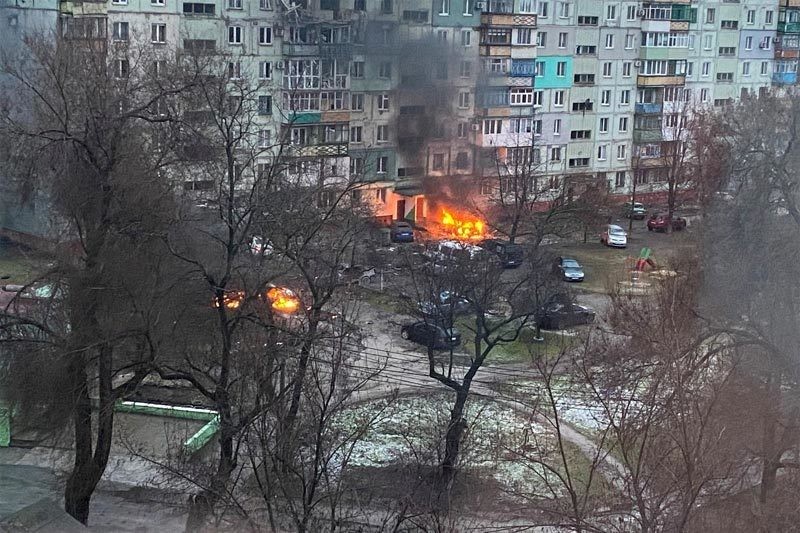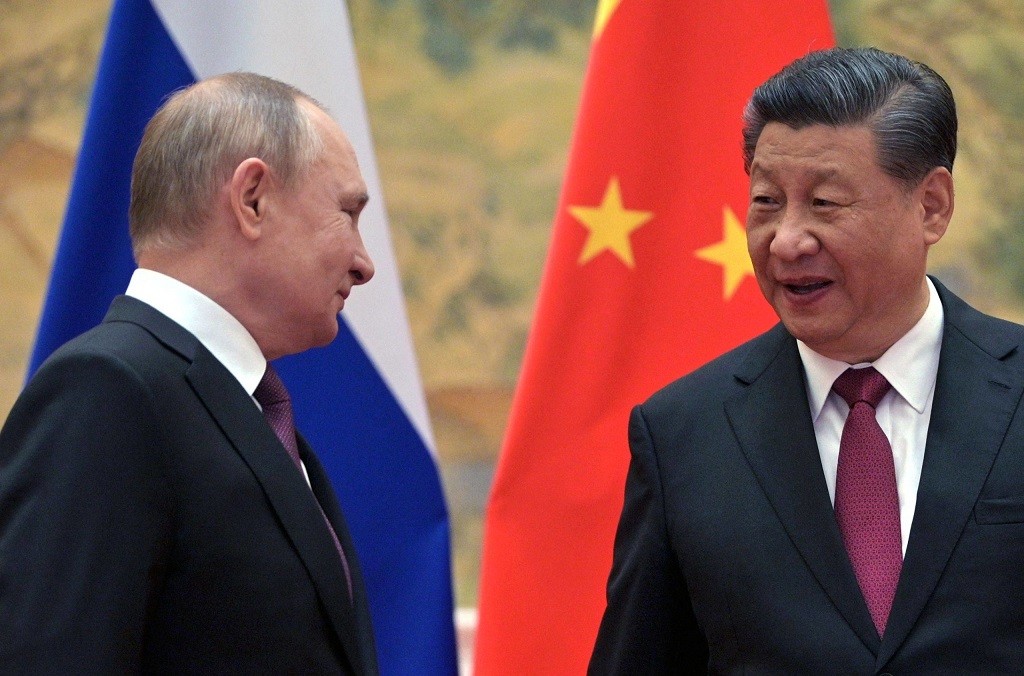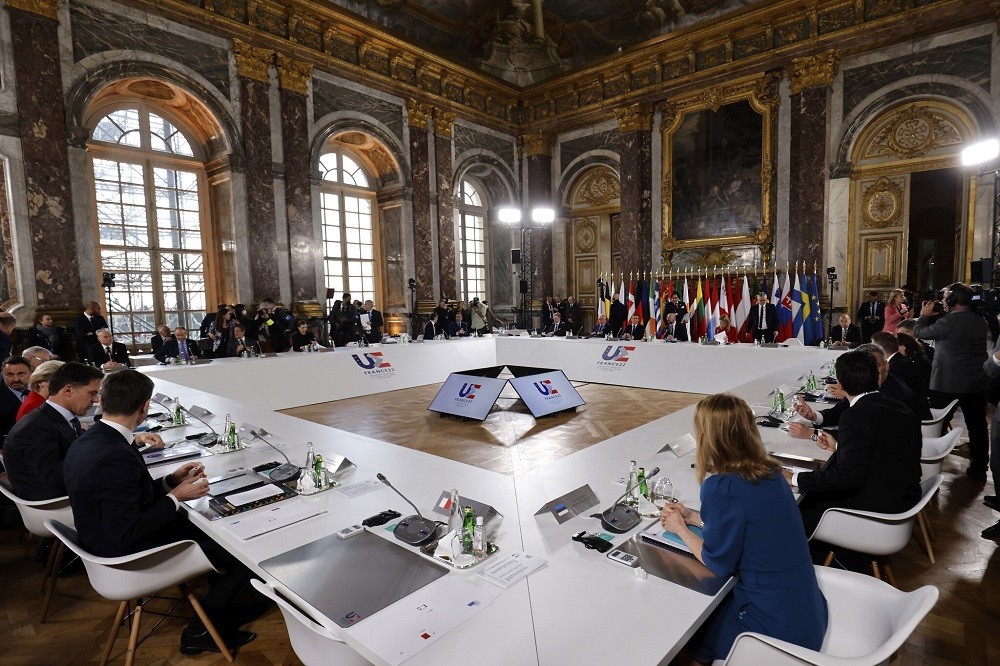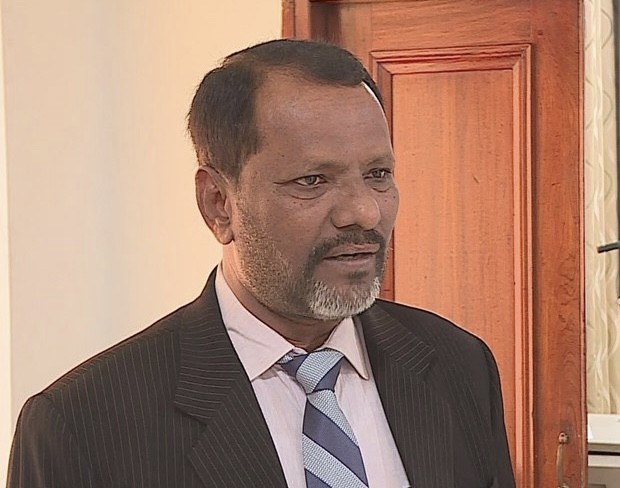
Expert: Russia-Ukraine conflict put Cold War 2.0 on the line
Latest
 |
| The Russia-Ukraine conflict has been on-going since February 24th - Photo: Burning cards near an apartment complex in Mariupol, Ukraine after the Russian army's bombing on March 3rd. (Photo: Reuters) |
NATO at the center
Dear Professor Reddy, what were the reasons behind the current Russia-Ukraine conflict?
Russia and Ukraine’s conflicting stand on Kiev joining the North Atlantic Treaty Organization (NATO) was the focal point behind the current conflict. While Ukraine has been interested in becoming a member of NATO, Russia is not happy with that plan.
As a sovereign and independent country, Ukraine has a natural right to choose to join NATO or to build relations with Russia or China, or the European Union (EU). Nevertheless, Russia believed that if Ukraine became a NATO member, American troops will soon come closer to Russia’s border.
Interestingly, after the collapse of the USSR, three of its former republics joined NATO, yet Russia never raised any objection. However, Russia has been very worried about Ukraine because of its strategic location, size of economy and progression of science and technology.
Surprisingly, in 2008, only 28% of Ukrainians voted in favor of NATO membership, but the voting pattern was changed by 2014 with more than 60% in view of Russia’s annexation of Crimea in 2014. This voting pattern clearly indicates that Russia had lost the confidence of Ukrainians and Kiev has considered Moscow as a threat to its national security.
Yet, there is only one focal point i.e., Ukraine joining NATO. In 2019, the Ukraine parliament has passed a bill which may clear the route to join NATO. Then, 2021 onwards, the process has been speeded up by Ukraine, as well as NATO. However, member countries and the Secretary General initially refused to admit Georgia and Ukraine in 2008.
It was enough for Russian President Vladimir Putin to announce the beginning of its so-called “special military operation” in Ukraine, as he declared: “However, Russia cannot feel safe, develop, and exist while facing a permanent threat from the territory of today’s Ukraine.”
The reasons behind the Russia-Ukraine conflict are not so strong, but unnecessary speculations and suspicion dominated the bilateral understandings. Both Russia and Ukraine have lost confidence and mutual respect. That was the driving force behind the current conflict.
| The reasons behind the Russia-Ukraine conflict are not so strong, but unnecessary speculations and suspicion dominated the bilateral understandings. Both Russia and Ukraine have lost confidence and mutual respect. That was the driving force behind the current conflict. |
No-fly zone and China
Recently, on March 18th, Russia established a no-fly zone over Donbass. Will NATO follow this footstep and establish a no-fly zone over Ukraine?
Ukraine’s demand from the West has been clear from day one: Aid, specifically militarily and a no-fly zone from the West. Nevertheless, as per the international laws, no country can be involved directly in a conflict of others. If any country, or a military organization like NATO enters this conflict, then it will no longer be considered a conflict between Russia and Ukraine, but rather a world war, with grave consequences for the entire world.
However, many European countries, including NATO members, are liberally providing financial support, moral support, and even military equipment to Ukraine. As a result, the conflict has been extended much further than expected.
In addition, there are allegations from both ends that mercenary soldiers are also involved. As Ukraine was believed to receive supportive mercenaries from the EU and NATO, Russia’s military operations also involved Chechen soldiers on the front. Nevertheless, no other country has been directly involved in the ongoing conflict.
What is China's role in this Russia-Ukraine conflict?
There was a request from Russia, asking China for support.
However, there is this big question: Does Russia really require support from China? As the entire world knows about the defense capabilities of Russia, in fact, it needs only moral support from a country like China.
Currently, a majority of countries, specifically, NATO and EU members are trying to blame President Putin and attempt to isolate Russia. To avoid having such face-off situation, Russia wants to seek support from China.
Recently, China said that Russia is a sovereign country and has every right to decide whatever it wants to do. Yet, China wanted to maintain the distance. Its stand is very clear: China does’t want to be involved, in any form, in this ongoing conflict.
 |
| Chinese President Xi Jinping met his Russian counterpart Vladimir Putin on February 4, 2022 in Beijing. (Photo: Sputnik) |
Cold War 2.0 and possible scenarios
What would be the possible or expected outcome of a series of negotiations between Russia and Ukraine?
Regular meetings are going on between Russia and Ukraine representatives. However, nothing significant has been achieved.
Meanwhile, US President Joe Biden and his Chinese counterpart Xi Jinping had met virtually but they failed in providing substantial hope towards stopping the conflict.
Surprisingly, Russia has been changing its agenda from one to the other meeting. Before the conflict, Russia’s demand was limited to keep Ukraine away from NATO but now, it is enhancing its agenda with demands such as recognizing Crimea as part of Russia, DPR, LPR as autonomous regions and so on.
Despite Ukraine’s readiness to withdraw its bid to join NATO and to be a neutral country, Russia has not been inclined to such proposals. On the other hand, Ukraine has not been in a position to accept the entire agenda of Russia.
The influence of NATO and EU from Ukraine side and China from the Russian side may have tremendous influence over the outcome of the ongoing series of negotiations, if not directly but indirectly.
Is there any scope for a third country to negotiate between Russia and Ukraine?
Such an initiative by a group or single country such as China, India, Brazil etc may achieve certain progress to stop the ongoing conflict. Unfortunately, no country has come forward to take up such a job.
Certainly, the US can’t be considered as a third party since it has been directly at the helm of matters of Russia’s military operation in Ukraine.
Meanwhile, China categorically said that it is the choice of Russia being a sovereign country to take its own decisions. India has been maintaining equal distance. But some of the member countries from EU are capable of meditation across the table, as they have equally good relations with both countries. Absolutely, there are no such indications from any corner of the world about making a peace deal between Russia and Ukraine.
| Despite Ukraine’s readiness to withdraw its bid to join NATO and to be a neutral country, Russia has not been inclined to such proposals. On the other hand, Ukraine has not been in a position to accept the entire agenda of Russia. |
What are the implications of Russia-Ukraine conflict on the global order and Indo-Pacific region, specifically?
Firstly, the ongoing military operations of Russia have provided a direct answer to the world that this is the beginning of Cold War 2.0. But the intensity and extent of such Cold War will depend upon the duration of the conflict.
For instance, if the conflict ends immediately, the possibilities of reducing the gap between countries are greater. If the conflict goes for months or years, the levels of misunderstanding and possible gap may be widened, which may hamper the chances of cooperating with each other.
Evidently, NATO and the EU are trying to contain Russia and extending their support and also encouraging Ukraine to continue the war. The US and Russia are seriously planning for long-run political mileage rather than economic benefits. In fact, it is the perfect scenario of the Cold War.
Fortunately, the end of Cold War has given an opportunity to cooperate at different levels and platforms to negotiate for the betterment of the respective countries. Unfortunately, such a scenario has not been long lasting due to the ongoing conflict and related circumstances.
For instance, the EU has been proved as one of the most successful regional groupings in negotiating for economic growth and development. Nevertheless, current trends of geopolitical framework across the Europe are clearly indicating that EU has been sacrificing its economic benefits at the cost of political dominance in the region. It may be difficult to predict that this political game will be limited to NATO, EU and Russia or will spread to other parts of the world.
In addition, since the end of the Cold War, the US has been quite busy promoting the concept of the Indo-Pacific or extended Asia-Pacific. Obviously, India and the Indian Ocean have got the highest priority, proven with the US reviving the Quad. Expectedly, China has not been happy and expressed its displeasure in many forms on different platforms, in view of the growing significance of India.
At this juncture, the Quad process has been sidelined or shadowed. The most challenging issues, like the East Sea and China’s aggression in the Indo-Pacific region, are not being seriously considered. However, such a scenario may only last briefly until the Russia-Ukraine conflict is resolved. Otherwise, put together, this could lead to a major division of the world towards an intensive Cold War.
Furthermore, it would be hasty to conclude either way that the world may experience yet another Cold War or the ongoing Russia-Ukraine conflict will end fruitfully, and the world returns to the post-Cold War scenario.
 |
| The European Union (EU) has been sacrificing its economic interests to help Ukraine during its conflict with Russia - Photo: EU countries' leaders during a meeting on March 10, 2022 at the Palace of Versailles, Paris (France). (Photo: AP) |
Similar stances, common interests
Could you elaborate on India’s position on the conflict?
So far, India has kept maintaining equal distances between Russia, Ukraine and its allies. In fact, India has expressed its hope for a conflict resolution immediately.
I strongly believe that India and Viet Nam should take combined decisions to protect their interests at a regional and global level, specifically in the Indian Ocean and the East Sea, respectively.
It is undisputable that India and Viet Nam have been sustaining their relations with the erstwhile USSR and now Russia. Let me say that India's relations with Russia, as well as India's relations with Viet Nam, have no boundaries.
To be frank, as an Indian, I should acknowledge the USSR’s support of India specifically in the areas of defence and science and technology during the Cold War period. Therefore, an appropriate credit should be given to the USSR for its support in achieving the present global status of India in defence and science and technology.
Even after the collapse of USSR, India has been maintaining good relations with Russia. There will not be any problem sustaining bilateral and trilateral relations, even in the future, for better prospects.
Thank you, Professor!
Professor G. Jayachandra Reddy is the former Director of the Centre for Southeast Asian & Asia-Pacific Studies of Sri Venkateswara University (India) and a member of the International Society of Asia-Pacific Studies (India). |


















